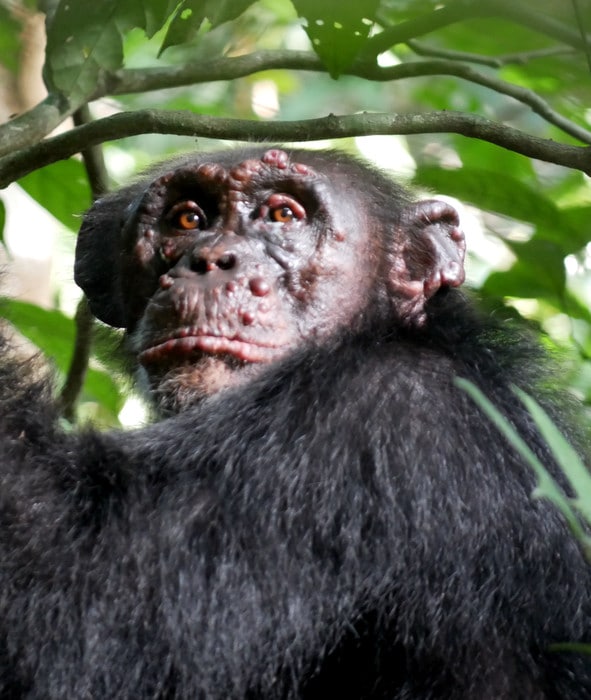
Although the symptoms are strikingly similar to those of people with advanced leprosy, it is still questionable whether the disease is indeed human-transmitted.
Researchers have noticed cases of leprosy in two different groups of chimpanzees. One population lives in the West African country of Guinea-Bissau, while the other group resides in the Ivory Coast. It’s a disturbing discovery. Because it is the first time that leprosy has been diagnosed in wild chimpanzees.
Leprosy is a contagious infectious disease caused by the bacterium Mycobacterium leprae. Leprosy can lead to serious deformities of hands, feet and face. Infection with the leprosy bacterium probably occurs via droplets that are spread by leprosy patients, for example when coughing, sneezing or talking. Patients can also spread the bacteria through sores and skin lesions. The infectious disease occurs in many countries worldwide, especially among poorer population groups.
We have known for some time that chimpanzees can get the infectious disease. For example, there are known cases of chimpanzees living in captivity. But it is surprising that wild chimpanzees have now also been diagnosed. “This is the first confirmation of leprosy in non-human animals in Africa,” said study leader Kimberley Hockings. “It’s amazing that the disease affects our closest living relative, the chimpanzee, especially when you consider how well wild chimpanzees have been studied.”
Guinea-Bissau
Researchers noticed the first possible symptoms of leprosy in a population of chimpanzees in Guinea-Bissau. “The symptoms were strikingly similar to those of people with advanced leprosy,” Hockings said. “Think of lesions and the characteristic claw hand. We immediately contacted an expert to have these cases genetically confirmed.”

A chimpanzee named Brinkos, living in Guinea-Bissau, with leprosy. Image: Cantanhez Chimpanzee Project, Elena Bersacola, Marina Ramon
Following these findings, the researchers discovered further cases of leprosy at another study site, namely the Parc national de Taï in Côte d’Ivoire. An autopsy of an older female, as well as fecal samples from an adult male, confirmed that leprosy was circulating in the chimpanzee population.

Leprosy has also emerged among wild chimpanzees in Ivory Coast. Image: Tai Chimpanzee Project
The origin of the infections is still unclear. But according to the research team, the results, published in the journal Nature, indicated that leprosy probably circulates among more wild animals than previously suspected. This may be the result of exposure to humans, although there could also be other unknown causes.
People
Humans are considered the main host of the Mycobacterium leprae-bacteria. The bacteria can then transfer to other mammals, such as the nine-banded armadillo and red squirrels. Whether the chimpanzees contracted the disease from humans remains to be further investigated. However, analyzes show that the strains of leprosy contracted by the chimpanzees are very uncommon in humans. “The strains discovered in each chimpanzee population are very different,” explains researcher Charlotte Avanzi. “Both are rare among humans and in other animal reservoirs around the world.”
Handover
Still, the researchers do not rule out the possibility that humans are involved in one way or another. “It’s possible that the chimpanzees living in Guinea-Bissau got the disease from humans in this shared landscape, although humans don’t kill or eat chimpanzees,” Hockings said. “But it’s clear that leprosy is now being transmitted between separate chimpanzee populations.” In Ivory Coast, chimpanzees live further away from human settlements. “Here, therefore, it seems more likely that the chimpanzees contracted the infection from another species, or from an environmental source such as ticks or bacteria living in water.”
Leprosy is easy to treat in humans with effective drugs. But the impact on the wild chimpanzees is still difficult to predict. “Western chimpanzees are critically endangered,” Hockings says. “So even if only a few individuals die, the consequences could be significant.” The researchers plan to keep a close eye on the primates. “Long-term monitoring and research is needed to determine the magnitude and potential effects of leprosy among wild western chimpanzees,” concludes co-author Roman Wittig.
Source material:
“Leprosy confirmed in wild chimpanzees” – University of Exeter
Image at the top of this article: Tai Chimpanzee Project